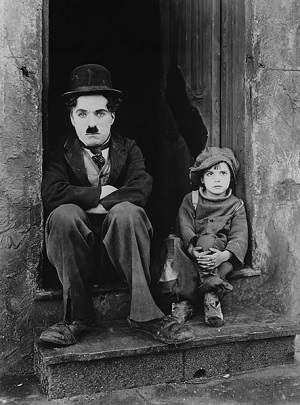Jack Smith (JS-95-223) and Rose Smith (RS-95-223)

Publicity photo from Charlie Chaplin's 1921 movie "The Kid". Public domain, via Wikimedia Commons
In Autumn 1995, Jack and Rose Smith came into contact with Cinema Culture in 1930s Britain through Cranmer House care home in Fakenham, Norfolk, joining the twenty-one individuals based in East Anglia who were interviewed for the project as core informants. One of six children, Jack Smith was born in 1911 in Wighton, Norfolk; his father was a foreman on three farms. He left school at fourteen and took up work in agriculture and in the grocery trade. Born in Wales in 1912, Rose Smith was one of five children of a gamekeeper father. On leaving school at fifteen, she took a job as a nanny, and subsequently entered the nursing profession. In later years she served as a youth leader and magistrate.
The Smiths took part as a couple in two interviews: on 24 October 1995, they participated in a group interview along with two other Cranmer House residents, and on 2 May 1996 they were interviewed together. Meanwhile, Mr Smith gave a solo interview on 21 November 1995. Because of Mr Smith's visual impairment and his wife's difficulties with hearing, the dynamics of these interviews, all of which were conducted at Cranmer House, are at times difficult. They are distinctive, however, in shedding light on the rural cinemagoing experience in the interwar years. None of the participants in the group interview claim to have been regular cinemagoers, but they jog each other's memories, naming several cinemas in Norwich and also mentioning music hall artistes and radio personalities who made films--these include Jack Hulbert and Cicely Courtneidge, particular favourites of Jack Smith's. Mr Smith recalls that his main interests were cricket and football, and says he only saw a film (which could involve walking from his home in the village of Wighton to one of the two cinemas in Wells next the Sea) when there was nothing better to do. Rose Smith, who grew up in rural Wales, likewise rarely went to the pictures, because she lived "miles from anywhere". However, the film Mandy, which the couple saw together, clearly made a great impression on them: it is mentioned in all three of their interviews. Jack Smith's solo interview, conducted when his wife was in hospital, opens by revisiting the film personalities mentioned previously, and he is asked what he liked about favourites such as Cicely Courtneidge and Jack Hulbert. He recalls that he would go to the cinema in Wells next the Sea from his home village of Wighton by bicycle or on foot. Reiterating that he was not much of a filmgoer, his main hobbies being cricket and football, he insists that he did not discriminate when it came to choosing films to see--"We just went to the pictures"-- though he does concede that he might take "a young lady". He finds it difficult to put into words his reasons for liking or disliking a star or a film, or to say how he felt at the pictures; but he does admit to a liking for westerns and for comedy of the knockabout variety, and even hints at an appetite for violence in films or sport. He recalls that he usually went to the pictures with male friends, and would occasionally travel by train to Norwich, where he found the cinemas more sophisticated than the ones in Wells. He notes that his parents were religious and never went to cinema themselves, though they did not object to his going. Further reference to Mandy prompts a discussion of child stars; and another insistent recollection is of his visit to the 1924 Empire Exhibition at Wembley. Reverting to the present, the BBC 'Panorama' interview with Diana, Princes of Wales, which had been broadcast the previous evening, is discussed. In the Smiths' joint interview, the names of film personalities mentioned previously come up once again. Discussion then ranges widely, with a focus on memories of rural life: Rose's early years and her post as a nanny; her father's work as a gamekeeper; Jack's first job on a farm; how the couple met; Jack's memories of village life in Wighton, where everyone knew each other; seeing magic lantern shows as a child; religious observance in the villages; the special cinema bus that travelled between Wighton and nearby villages and Wells; and the general experience of growing up in the countryside. Once again Mr Smith refers to the 1924 Empire Exhibition at Wembley; and the couple discuss violence in films today, drawing comparisons with the TV drama serials they enjoy. Audio-synced interview (1 of 3)Interview transcript | Listing of cinemas, films and stars mentioned
Audio-synced interview (2 of 3)
Interview transcript | Listing of cinemas, films and stars mentioned
Audio-synced interview (3 of 3)
Interview transcript | Listing of cinemas, films and stars mentioned
Documents, Memorabilia and Related Links
East Anglia home pageThe Norvic, Norwich (cinematreasures site)
Theatre de Luxe, Norwich (cinematreasures site)
'Do you remember these Norwich Cinemas' (Eastern Daily Press site)
Tessie O'Shea (fromthevaults-boppinbob site)
Extract from Mandy, 1952 (YouTube)